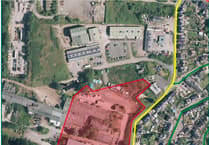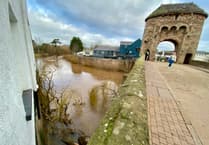TWO years of studies focused on the notorious traffic bottleneck on the A48 at Chepstow has confirmed what thousands of frustrated commuters already knew: there are congestion and air pollution problems and public transport is not great.
The immediate action by local councils is to commission m ore studies.
The prospects for a by-pass seem as distant as ever with local authorities not even having agreed which of them would lead on the project.
Instead they want to encourage more of us to swap our cars for buses, trains and "active travel" - council speak for walking and cycling.
The Chepstow Transport Study was commissioned by local authorities including Monmouthshire County Council and the Forest of Dean District Council.
The study recommends more work divided into three "packages" - walking and cycling, public transport and a by-pass.
A spokesman for Monmouthshire Council said: "The Chepstow Transport Study highlights several problems to be addressed surrounding public transport and active travel but possibly the highest profile problem lies largely in traffic congestion on the main public highways converging at Chepstow.
"The impact is felt by local residents in terms of routine inconvenience and more seriously air pollution - the A48 on Hardwick Hill, Chepstow is an air quality management zone - but there is also the impact upon motorists travelling through the area as traffic jams are frequent and prolonged at various times during the day."
The active travel package will investigate in detail transport management including vehicle access - including part-time pedestrianisation options - car parking, walking and cycling improvements.
It will also look at routes in communities on both sides of the border, provide costed priorities and provide potential funding opportunities.
The second package - public transport - will look to develop options for enhanced links to bus services and and active travel routes to offer a sustainable and practical alternative to car use.
It would also investigatehow this integrates with car users in terms of things such as parking and electric vehicle charging.
The by-pass package would be a pre-design study and would include a preliminary construction programme.
But while the money for the first two packages is there, Monmouthshire Council says the by-pass issue is "complex".
Continued on page three.
TWO years of studies focused on the notorious traffic bottleneck on the A48 at Chepstow has confirmed what thousands of frustrated commuters already knew: there are congestion and air pollution problems and public transport is not great.
The immediate action by local councils is to commission m ore studies.
The prospects for a by-pass seem as distant as ever with local authorities not even having agreed which of them would lead on the project.
Instead they want to encourage more of us to swap our cars for buses, trains and "active travel" - council speak for walking and cycling.
The Chepstow Transport Study was commissioned by local authorities including Monmouthshire County Council and the Forest of Dean District Council.
The study recommends more work divided into three "packages" - walking and cycling, public transport and a by-pass.
A spokesman for Monmouthshire Council said: "The Chepstow Transport Study highlights several problems to be addressed surrounding public transport and active travel but possibly the highest profile problem lies largely in traffic congestion on the main public highways converging at Chepstow.
"The impact is felt by local residents in terms of routine inconvenience and more seriously air pollution - the A48 on Hardwick Hill, Chepstow is an air quality management zone - but there is also the impact upon motorists travelling through the area as traffic jams are frequent and prolonged at various times during the day."
The active travel package will investigate in detail transport management including vehicle access - including part-time pedestrianisation options - car parking, walking and cycling improvements.
It will also look at routes in communities on both sides of the border, provide costed priorities and provide potential funding opportunities.
The second package - public transport - will look to develop options for enhanced links to bus services and and active travel routes to offer a sustainable and practical alternative to car use.
It would also investigatehow this integrates with car users in terms of things such as parking and electric vehicle charging.
The by-pass package would be a pre-design study and would include a preliminary construction programme.
But while the money for the first two packages is there, Monmouthshire Council says the by-pass issue is "complex".
The report suggests two options for a by-pass: one with a 60mph speed limit and one with a 40mph which makes more use of existing roads.
A Monmouthshire Council spokesman said the by-pass project "is subject to further discussions about how the scheme might be funded, which authority might take the lead, etc."
The active travel package is to be commissioned in the coming weeks.
It will be funded by the Welsh Government through Monmouthshire Council with potential contributions from Gloucestershire County Council and Forest of Dean District Council.
The funding from the English authorities will be subject to bids and the agreement of thecouncils.
 The public transport package is again funded by the Welsh Government and the study will be undertaken in this year.
Monmouthshire’s Cabinet member with responsibility for strategic integrated transport, Cllr Jane Pratt (Con, Llanelly Hill) said: "It’s heartening that all of the local authorities, government departments and other public bodies have worked positively towards getting to this stage and that some aspects of the study are set to progress.Â
"As a cross border project it has proven successful so far, although I acknowledge the challenges regarding transforming proposals into reality."
The full report and a summary are available to download at www.monmouthshire.gov.uk




Comments
This article has no comments yet. Be the first to leave a comment.